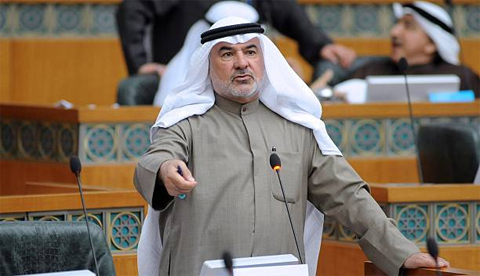 MP Saleh Ashour
MP Saleh AshourKUWAIT: Rapporteur of the National Assembly's financial and economic affairs committee MP Saleh Ashour said yesterday that imposing charges or taxes on money transfers by expatriates is in line with the constitution despite warnings by the Central Bank and experts. Ashour said the proposed tax is like the fees collected by banks and moneychangers when they make such transfers. The lawmaker's statements come as the financial committee is studying four proposals to impose taxes on expatriates' remittances.
Head of the committee MP Salah Khorshid said recently that the committee will soon make a decision to select one of the four proposals it is considering for introducing the charges. He said if the tax is imposed, between KD 50 and 60 million will be collected every year and the revenues will go to state coffers. Khorshid also strongly denied that the proposals breach the constitution.
The Assembly's legal and legislative committee had rejected the proposals and the principle of taxing expatriate money transfers only, saying it involves discrimination banned under the constitution. The Central Bank had also warned against imposing such taxes, saying it will be counterproductive and will encourage black market transfers. But Ashour insisted that the constitution allows imposing fees and taxes on expatriates in line with existing laws, provided some consideration should be given to low-income people, who could be exempted.
Meanwhile, opposition MP Adel Al-Damkhi called yesterday for putting an end to the case of the National Assembly building storming by approving a general amnesty law that should cover a well-defined duration. Damkhi said the proposed general amnesty should deal with political crimes that took place several years ago amid a highly-charged situation, during which nationalist activists protested against corruption that led them to enter the Assembly building.
Damkhi was referring to a demonstration in mid-November 2011 when hundreds of activists took to the streets to protest against corruption by over a dozen lawmakers who allegedly accepted millions of dinars in bribes. The government referred 70 of the activists to court. They were all acquitted by the criminal court but the appeals court sentenced 67 of them to between one and nine years in jail. Two were given suspended jail terms while charges against one were dropped due to his death. A large number of those convicted spent three months in jail while the case was being referred to the court of cassation, which freed them pending trial.
Opposition lawmakers have called for the Assembly to pass a law granting all the activists a general amnesty. Several MPs however opposed the move and demanded a wider amnesty law to cover other prisoners.
By B Izzak











